Quiz Answer Key and Fun Facts
1. As a member of the Upperclass, what are you using when you spray a liquid substance to your body to enhance your smell?
2. Getting ready to face the world as a member of the Upperclass, you must check your reflection to ascertain that you look your best. What do you look into?
3. You are an Upperclass man or woman who has just visited my abode. Meeting my expectant gaze, you say, "You have a lovely home".
4. On a cold and gloomy night at your large country manor, you and your friends decide to start a roaring fire. As an Upperclass man or woman, what do you call the ornate structure built around and above your fireplace?
5. As a member of the Upperclass, what do you call the last course of dinner?
6. You love to have fruit preserves on your toast in the morning. What is the Upperclass word for this type of spread?
7. Some friends have arrived to your lovely estate for a visit. Always the Upperclassman (or woman), you invite them into a room designated for entertaining visitors. What do you call this room?
8. When someone asks you how your grandmother is doing, you wish to relate the incidence of her death. How do you, as a member of the Upperclass, impart this information?
9. You are a member of the Upperclass and have deigned to speak to a non-U person. You wish for your companion to repeat something he has said, so you say, "Pardon?".
10. You plan to write a letter to an old school friend. As an Upperclass man or woman, on what type of paper are you writing?
Source: Author
pagiedamon
This quiz was reviewed by FunTrivia editor
agony before going online.
Any errors found in FunTrivia content are routinely corrected through our feedback system.

